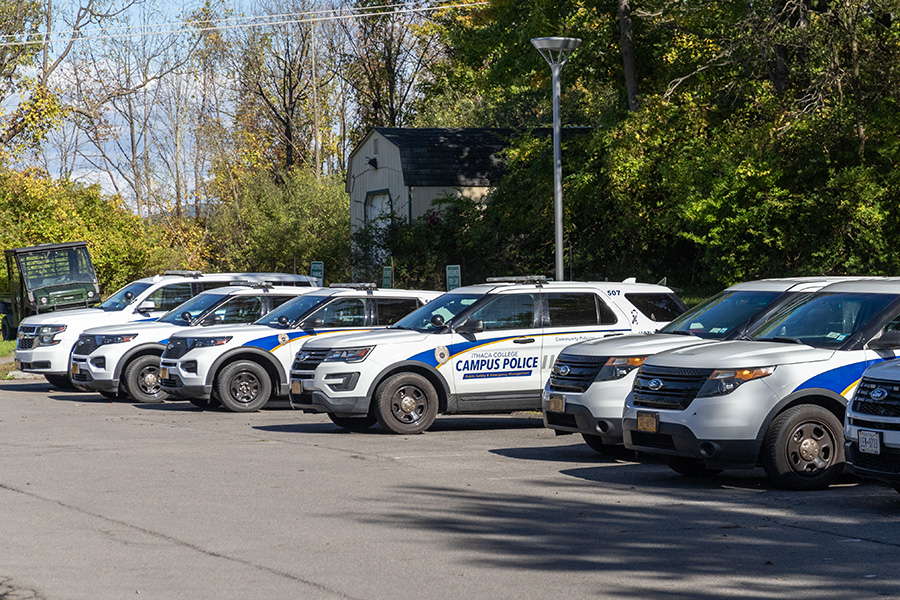Ithaca College’s only staff union — The United Government Security Officers of America Local 507 — advocates for fair working conditions, compensation and disciplinary procedures for some employees within the Office of Public Safety and Emergency Management. The UGSOA’s current contract with the college lasts through June 2026.
History: The college’s first union
Master Security Officer Amy Noble, the president of the union, said employees from OPS’ Department of Patrol and Security Services started discussing forming a union in 2003. They were concerned about scheduling conflicts, promotion procedures and inconsistent discipline for OPS employees, and believed a union could give them a collective voice to advocate for fair working conditions.
Noble said the college told OPS administrators to discourage employees from unionizing and instead work with employees to address their concerns.
“We were the first union ever at the college, so this was a big thing, and there was a lot of union busting,” Noble said. “There was a lot of animosity, some retaliation, which is to be expected during a time like that. … Sometimes you were approached [by OPS administrators] off to the side saying … ‘You’re going to ruin a good thing that’s going on here. The college has always been loyal to its employees.’”
Within the Department of Patrol and Security Services, the union has included sergeants, master patrol officers, patrol officers, master security officers, security officers and communications specialists since it was formed. The department also includes lieutenants, the associate director and director of OPS, but employees who work in management positions cannot join unions according to the National Labor Relations Act. Within the Department of Parking Services, parking services assistants have been eligible to join the union.
Eligible employees voted 18–7 to unionize in December 2003. Since the majority of employees voted to unionize, the National Labor Relations Board recognized the union as an official collective bargaining unit associated with the UGSOA as local chapter 507.
Peggy Ryan Williams, president of the college at that time, said in a 2003 Intercom post that she was disappointed OPS employees chose to work with an outside organization to discuss working conditions.
“We have not had any unions at Ithaca College because the college is viewed by most as a good place to work and the majority of employees have concluded that they are better off maintaining a direct working relationship with their supervisors, managers and administrators,” Williams said in the Intercom post.
Emily Rockett — vice president, general counsel and secretary to the Board of Trustees — said that she cannot speak to the past, but that the college has worked with employees to establish and maintain fair procedures and working conditions.
“It’s very important to the administration to do right by all of its employees, unionized or non-unionized, and the college in the time that I have been here has been very conscientious about the rights of all of our employees,” Rockett said.
How the union works
The union negotiates a collective bargaining agreement (CBA) — a written agreement between the union and the college that outlines terms for union members’ employment and compensation — with administrators from the college and OPS. The union also represents members in disciplinary meetings; provides legal support and advice; communicates between its members and the college and assists members through the grievances process if they believe the college has violated the CBA terms.
Noble said the union’s labor management committee meets with OPS administrators to discuss things like scheduling conflicts, additions or revisions to workplace policy and workload concerns about every two months.
The union’s current CBA is in effect from June 30, 2022 to June 30, 2026. Rockett said the union and the college will likely start negotiating the next CBA shortly before the current CBA ends.
Collective Bargaining Agreement
The union’s CBA is not posted publicly, but the union shared it with The Ithacan. The CBA includes guidelines for all aspects of employment, including seniority, layoffs, discipline, departmental investigations, hours of work and scheduling.
The CBA has a right-to-work clause, which means that employees are encouraged but not required to join the union. Eligible employees who choose not to join the union still receive benefits and protection from the union and must pay dues, but they cannot vote on contract negotiations or union elections.
Noble said all eligible employees have chosen to join the union, and the union has 24 members as of 2024.
The CBA includes progressive wage increases year-to-year: a 1% increase from 2022 to 2023–24, a 1.5% increase from 2023–24 to 2024–25 and a 2% increase from 2024–25 to 2025–26.
The CBA has a no-strike clause, meaning that union members cannot strike or support other striking workers on campus.
According to the CBA, parking services employees’ normal work week will be 37.5 hours and all other union members’ normal work week will be 40 hours. Employees will not work more than 16 hours consecutively unless in an emergency.
Patrol Officer Steve Hutchison, vice president of the union, said the CBA helps ensure that the college respects OPS employees’ work-life balance.
“There’s not always an understanding of the 24 hour … 365 [days per year] demands of employees here [in OPS],” Hutchison said. “When you’re working in a larger system of a college that has generally nine–to–five, 40 hour week employees, those policies don’t always translate to fair treatment for people who are working a much more varied schedule.”
Hutchison said patrol and security services employees have unique responsibilities compared to other college employees and face challenging situations where they have to quickly decide how to respond.
“Part of the union’s job [is] to make sure that those workers are protected in their job and in their decision making, as long as everything was done legally, morally and to the best of their ability,” Hutchison said. “If those protections aren’t there, judgments can be passed without fair and due process or just respect for the employee.”
The CBA says employees must be allowed to have a union representative and must retain their union rights and benefits during disciplinary meetings.
Hutchison said that after officers encounter new situations, the union works with OPS administration to develop clear procedures and implement additional training if necessary.
Community Engagement
Noble said union members are sometimes seen as “the bad guys” who disrupt the flow of OPS’ work. She said the union advocates for policy changes that improve officers’ working conditions and the entire campus’ safety. She said the union’s support helps members feel empowered to better support and engage with the campus community.
“We want to change the perception and we got a lot of positive people here that are willing to do that and go out, do the extra things outside their scope of their duties,” Noble said. “We got officers that’ll sometimes go out and change tires for people, and technically, they’re not really supposed to do that, but they do and sometimes that just doesn’t get noticed.”
OPS has six departments: Environmental Health and Safety, Clery Act Compliance, Emergency Management, Student Auxiliary Safety Patrol, Parking Services and Patrol and Security Services. Scott Garin, executive director and chief within the Office of Public Safety and Emergency Management, said union members and employees from the four nonunion eligible OPS departments share a common purpose and work together to support the campus community.
“From an office’s point of view, [there is] collective engagement from more than just the union,” Garin said. “We really make significant efforts to have positive experiences with the community that are developmental, educational and hopefully socially fun in nature.”
Garin said OPS regularly hosts outreach and prevention events, like self–defense workshops; Traffic Safety Education Week; and the IC Runs Purple 5k, which raises awareness about domestic violence.
OPS introduced the Prevention Education and Community Engagement (PEACE) Committee, which aims to build stronger community relationships and develop more ways to support the campus community in 2024.
Hutchison said he feels the collaborative nature of the union encourages members to work together to promote OPS’ goals and mission.
“When a union is in place, it really fosters that togetherness and that community that’s important to an effective workplace, and that’s what we’re trying to definitely carry forward here,” Hutchison said.
















